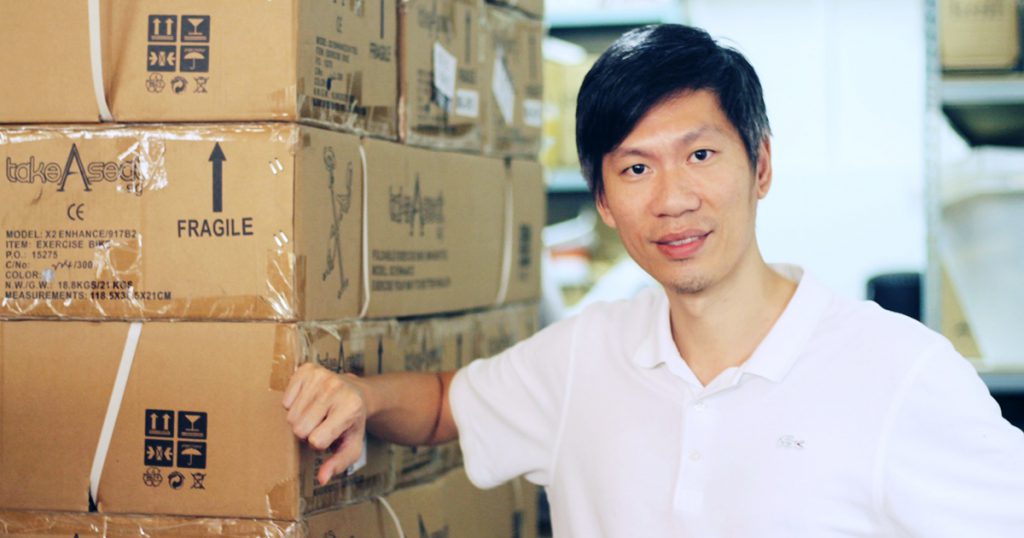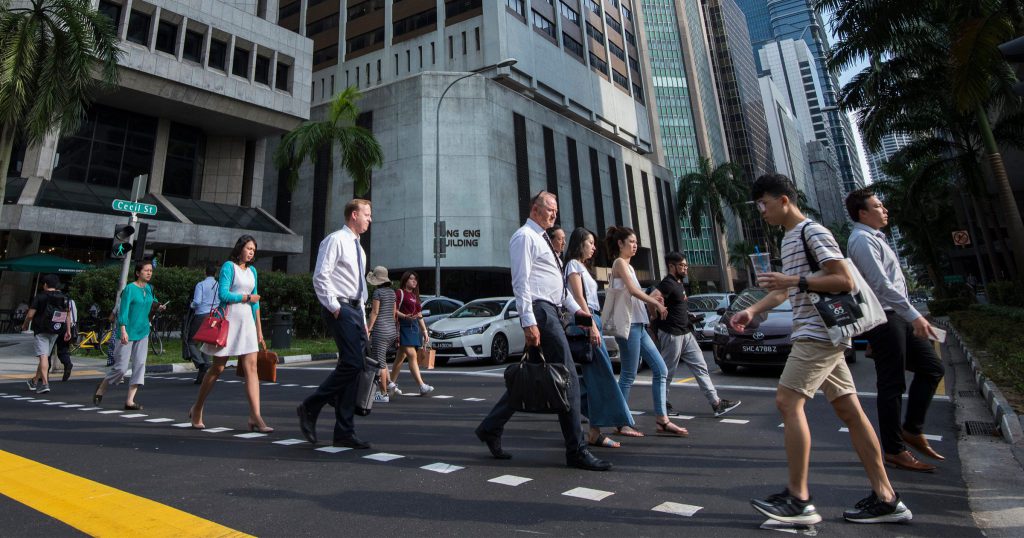Many entrepreneurs hope to conceive business ideas that help people solve certain pain points.
For founder of TakeAseat Dale Tan, the ‘pain’ that laid a foundation for his company was one he experienced literally.
Anyone with an avid love for sports, as Dale had in his twenties, would know that overexerting yourself can put you at risk of injuries.
And once you get hurt, you may be stuck with an old injury that keeps coming back to make life miserable.
Back then, Dale found himself afflicted by a serious back injury that restricted him to his bed for days, after getting hurt in one of his frequent beach volleyball sessions.

“It was hurtful to sit on normal chairs, or to try and straighten my back. I had trouble moving or even turning my body, and I basically had to be served three meals in bed,” he says.
When an injury like that hits you, you realise you’re not so strong. It wasn’t going to just recover and disappear, like I thought when I was younger.
To alleviate his pain, Dale began searching for a good chair to support his spine, which led into deeper research about how ergonomics could help.
All he could find were a few limited options from “one major player”, whose chairs were mostly priced in “the $300 to $400 range”.
Thinking that others could also benefit from treating their backs better, Dale decided he would seize the opportunity to “enter the market and drive the price down”.
Today, the 40-year-old has since been importing and selling posture-positive furniture for nine years.
From Chasing Action, To Pushing Sales
While his current field of expertise is far from what people consider exciting, Dale actually led a different life as a police officer at one point of time.
When asked why he signed on, he candidly blames “too many Hong Kong movies” for giving him a thirst for action.
“The first two years were exciting!” he says, but he later found out that the reality of police work was more mundane than he expected, and by the seventh year there wasn’t much he still looked forward to at the job.
After leaving the Police Force in 2007, Dale simply wanted to find a new job and get by.
He never planned to take the route to entrepreneurship, but its first seeds were sown when he casually started buying and selling things online in the midst of job-hunting.
As one thing led to another, Dale was importing goods to sell on marketplaces like eBay and Yahoo! Auctions, and regularly taking note of consumer trends as well.
“That was the time iPhone soared to popularity with its first generation release, so I began importing handphone cables and accessories to sell,” he says.
It wasn’t long before he diversified to more products, even items like earrings from Korea.
Sooner or later, he was the owner of an eCommerce business.

But people weren’t convinced by what he did for a living—online shopping wasn’t as mainstream as today, and their mindsets and trust still lied with retail.
In the rough early days, Dale took on delivery jobs to “make up [his] pay” when he wasn’t getting a substantial income. He also had to take it in stride when people at business networking events turned away upon hearing that he was “selling on the internet”.
“The first year is the most difficult, when you’ll always be tempted to look at recruitment ads,” he shares.
I was earning so little, and job listings were saying I could be earning so much more. Somehow you just have to stop looking at job ads, because they’ll make you feel so negative [about where you are].
These discouragements didn’t stop him from making it work, first of all by putting in $20,000 of his savings to procure a bedroom-full of stock.
Little by little, Dale’s operations expanded and took over one room after another, till all the boxes stacked in his house hindered his wife from watching TV in peace—finally, it was time to move it all into a proper warehouse.
Hitting $1.5M By Focusing On Posture
“After my injury, I looked online, visited stores, tested different chairs, and read up on plenty of posture research by doctors and physiologists,” says Dale.
All this went into consideration when he started sourcing office chairs to add to his online store.
Besides knowing the importance of posture support through his own ordeal, his belief was further validated when he saw that customers were pouring in with interest.
“We were struggling to keep up with demand, so by 2010 we set up TakeAseat as a separate website,” he says.
“We started thinking maybe we could be the shakers in the ergonomics market, because we were moving a lot of goods [for a small business]. Within one week, we could move one container [of office chairs].”

First starting with chairs from China, Dale made sure to keep expanding his range to give customers more choices across quality and price.
He looked to Korean and Taiwanese suppliers next, and he didn’t stop there.
A good chair may get one thing right, but Dale explains that the whole environment has to support your body’s needs too—so he began covering more ground with adjustable standing desks, laptop stands, and monitor arms.

While his main eCommerce business broke even in its first two years, TakeAseat now contributes most heavily to revenue.
Most recently, TakeAseat raked in $1.5 million in revenue for 2018, after a 50% year-on-year growth from $1 million in 2017.
Far From Time To Take A Bow
In its infancy, the main challenge for TakeAseat was to dispel doubts as an online business, and to stand out against big companies like IKEA or Courts, which are usually the ‘obvious choices’ to shoppers.
Instead of just shouting about products no one had heard of, Dale decided to win his customers with strong service.
Giving longer warranties, free delivery, and helping customers assemble their products are methods he employs till today.

Sometimes he visits corporate clients and gives their staff on-site demonstrations, letting them choose which products to purchase and teaching them how to get the best out of their chairs’ adjustable features.
As they built up their reputation, companies like Prudential, National University of Singapore, ASUS and Lockheed Martin have made up some of their notable clientele.
Many years on, TakeAseat finds itself up against new challenges as a more mature business.
“There are different struggles for a company getting to its first $1 million [yearly revenue], and a company that wants to multiply that to $2 million or $3 million and beyond,” Dale says.
Increasing operations would require more manpower and warehousing space, both of which are tough to find and expensive in Singapore.
While most of his career as an entrepreneur has been through a screen, he recently explored some retail opportunities as “bigger shopping retailers are now willing to let [them] in at lower costs”.
Taking it offline for the first time, shoppers can find TakeAseat’s products at the Gain City Megastore @ Sungei Kadut, or experience their ergonomics for kids during roadshows.

Dale is far from ready to rest on his laurels, as he goes on to share the upcoming plans he’s working on.
“We’re looking forward to bringing in even more reputable brands from the US and Germany to add to our range, as well as working with physiologists to create videos that educate people about posture,” he says.
“Once that’s done, we will also move forward with our expansion to Malaysia and Vietnam in the next two years!”
If you’re looking for some (back) support, check out TakeAseat here or follow their Facebook page here.
This article was written in collaboration with TakeAseat.
Featured Image Credit: TakeAseat










